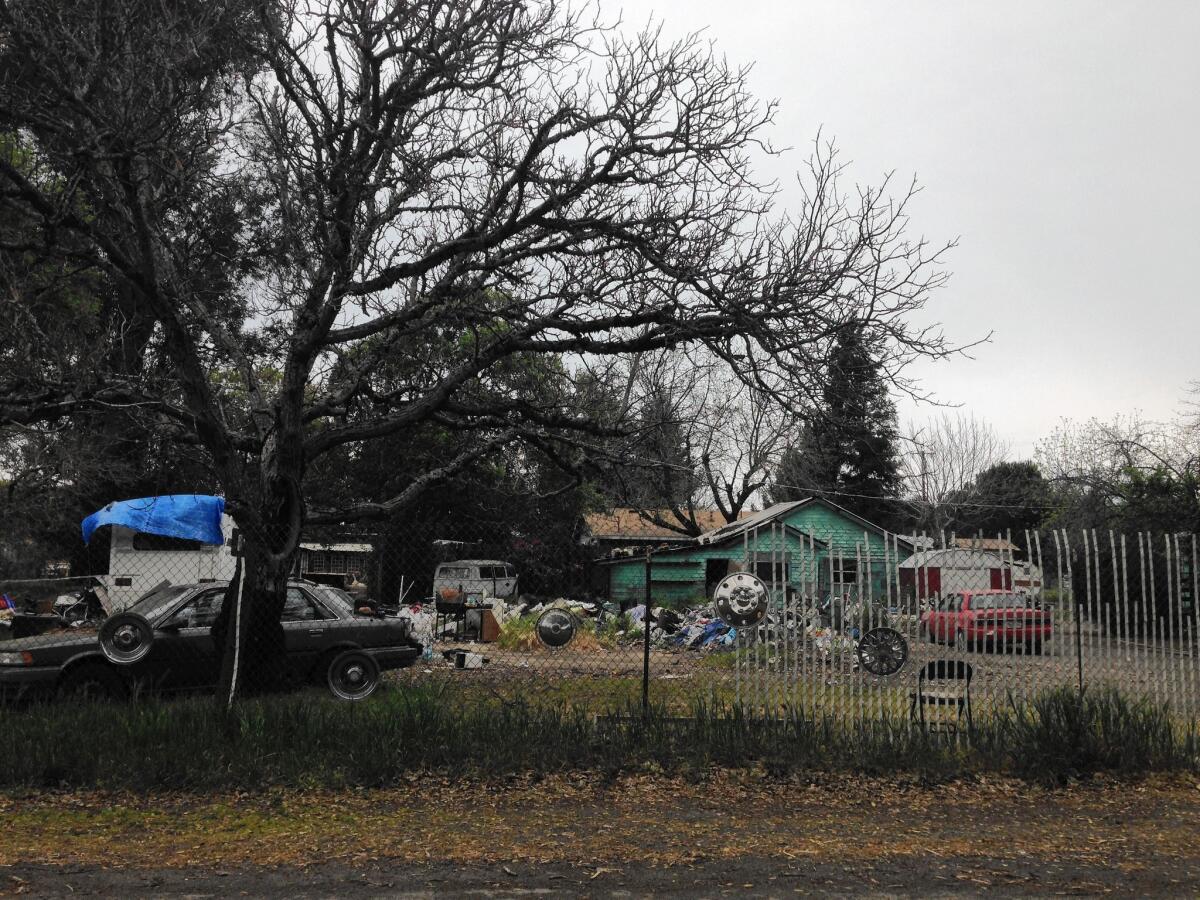California Journal: Pot farm a template for strapped Indian tribes -- or a cautionary tale?

The Pinoleville Pomo Indian tribe had planned to set aside 2.5 acres of land on a 99-acre reservation on the north end of Ukiah to grow hundreds of medical marijuana plants.
- Share via
Reporting from Ukiah, Calif. — It’s quiet this time of year in Mendocino County.
The marijuana plants are still tiny, so the air is fresh and unmarred by the skunky smell of ripe weed. Day workers have not yet invaded the area in search of lucrative work trimming the county’s famous resiny buds. “Helicopter season” — when skies thump with the sound of cops hunting down illegal “grows” — is months away.
Still, pot is very much on the mind of Mendocino County Sheriff Tom Allman.
Right now, sitting in his cluttered office, he’s concerned about a new venture involving a local Indian tribe, the Pinoleville Pomo Nation; a Kansas company called FoxBarry that helps Native American tribes develop for-profit ventures; and United Cannabis, a Colorado company that develops strains of pot.
The Pinoleville marijuana farm could be the first large-scale medical pot cultivation and distribution enterprise on tribal land in California, if not the country.
The tribe would devote 2.5 acres of its 99-acre rancheria to the venture, which would include 90,000 square feet of greenhouse for thousands of plants, far in excess of Mendocino County’s legal limit of 25 plants per lot.
“The tribe,” said FoxBarry Chief Executive Barry Brautman, “is exercising its sovereign right.”
Brautman, who is working on cannabis plans with six tribes both in and out of California, told me the $10-million venture will conform to the state’s medical marijuana laws and regulations. It will operate as a nonprofit and provide product only to medical dispensaries. No sales will take place on the tribe’s land.
As many states march toward marijuana decriminalization, if not outright legalization, the Pinoleville project could provide a template for cash-strapped tribes. Or it could prove a cautionary tale about the perils of navigating the maze of contradictory and confusing federal, state and local pot laws.
“The law of the land is not the law of the land,” said Allman, an amiable Humboldt County native who graduated from high school in 1979. He swears he’s never tried marijuana.
“It would not be unusual for someone to have two pounds of marijuana in a county where they are allowed to, and drive to a county where you can’t,” he said, “and they could be arrested, tried and convicted of a felony for something that wasn’t even against the law in another part of the state.”
::
In January, when the Pinoleville project became national news, many reports claimed that a 2014 Department of Justice memo gave tribes a green light to develop their own marijuana policies. That memo, written in response to inquiries from tribes in marijuana-friendly states, reiterated support for eight federal priorities on pot enforcement, including keeping it away from minors, preventing revenue from going to gangs and cartels, and preventing the diversion of marijuana to states where it is not legal.
The memo also noted that the priorities would apply “in the event that sovereign Indian Nations seek to legalize the cultivation or use of marijuana in Indian Country.”
So does that mean it’s OK for Indian Nations to cultivate or use pot? Who knows? Although federal policy toward marijuana has softened considerably, the government still classifies it as a Schedule 1 drug under the Controlled Substances Act, which means it has “no currently accepted medical treatment” (preposterous) and no “accepted safety for use under medical supervision” (ridiculous) and is more dangerous than cocaine (as if).
“The Department of Justice is absolutely still committed to enforcing the marijuana laws and the controlled substance laws in this country,” said Abraham Simmons, spokesman for Melinda Haag, the U.S. attorney for the Northern District of California who harshed Mendocino’s mellow in 2011 after the county allowed medical pot users to grow 99 pot plants per parcel. After Haag threatened legal action, the county scaled back to its current limit.
The local district attorney intends to enforce state and local laws.
“The feds didn’t send me any memo, and they don’t tell me what to do,” said Mendocino County Dist. Atty. David Eyster. “Marijuana is a state issue ... and medicinal marijuana cannot be grown with an intent to make a profit.”
Michael Canales, the Pinoleville tribe’s business board president, said Pinoleville is within its rights to develop a nonprofit farm.
::
Outside the tribe and its partners, the project seems to have few vocal supporters in Ukiah.
Small marijuana farmers, many of whom operated illegally for years, are worried that such a big enterprise will hurt their sales, strain the water supply and mar the county’s reputation for primo bud. “It’s like Costco coming to town,” said Julia Carrera of the Small Farmers Assn. “The small mom-and-pop can no longer survive.”
County supervisors, who learned about the tribe’s plans from newspaper accounts, are wary.
“This proposal flies squarely in the face of local law,” said Mendocino County Supervisor John McCowen. “And it’s hard for me to see how this would be consistent with state law.”
“I can understand how they would be allowed to grow it, but I don’t understand how they would distribute it,” said Supervisor Dan Hamburg. “This is supposed to be a money-making venture. How do they turn it into cash in such a confused legal environment?”
The money generated from pot sales, Canales explained, will be used to help the tribe reclaim its land, most of which is in a flood zone.
Maybe by the time helicopter season rolls around, the Pinoleville Pomo Nation will know whether its salvation lies in pot. But just in case, they also have plans for a casino.
Twitter: @AbcarianLAT
More to Read
Sign up for Essential California
The most important California stories and recommendations in your inbox every morning.
You may occasionally receive promotional content from the Los Angeles Times.











